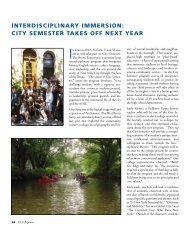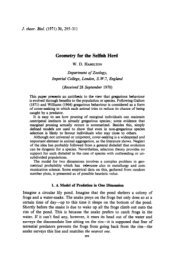Chapter 6 - Ethical Culture Fieldston School
Chapter 6 - Ethical Culture Fieldston School
Chapter 6 - Ethical Culture Fieldston School
You also want an ePaper? Increase the reach of your titles
YUMPU automatically turns print PDFs into web optimized ePapers that Google loves.
“Mr. Sinatra Gets Rejected”<br />
from work, Juanita may be less likely to get her news from a newspaper than by<br />
listening to the radio – a medium that came into its own in the twenties – but the<br />
content of what she absorbs, right down to the sensational murder trials and<br />
entertainment news, is much the same in its intense, but fleeting, interest. Even<br />
the evocative phrase “jangling drudgery” continues to describe the combination<br />
of hectic activity and numbing repetition that characterizes the workaday lives of<br />
most Americans.<br />
Changes in family life were also important. While women gained the right<br />
to vote in 1920, it was the developments that occurred in the domestic sphere –<br />
smaller families, more sexual freedom, and the replacement of servants by labor‐<br />
saving devices like vacuum cleaners and washing machines – that were more<br />
obviously transformative. While it’s possible to overstate the impact of the<br />
changes (not all young women were gin swilling flappers; labor‐saving devices<br />
were accompanied by rising housekeeping standards), 14 one nevertheless senses<br />
that the issues of the time gave rise to assumptions and language that have been<br />
with us ever since. In Only Yesterday, his history of the 1920s published in 1931,<br />
journalist Frederick Lewis Allen noted that “married women who were<br />
encumbered with children and could not seek jobs consoled themselves with the<br />
thought that home‐making and child‐rearing were really ‘professions’ after all.” 15<br />
One does not have to strain very hard to find an identical sentiment expressed<br />
today – or to find women, like Dolly Sinatra, who left much of their child‐care in<br />
the hands of others while they made their way in a so‐called “man’s world.”<br />
If women were increasingly going into the outside world, that outside<br />
world was also increasingly coming into the home. The first commercial radio<br />
14 For more on the role of technology in housekeeping standards, see Susan Strasser, Never Done: A History<br />
of American Housework (New York: Pantheon, 1982).<br />
American History for Cynical Beginners<br />
12
















